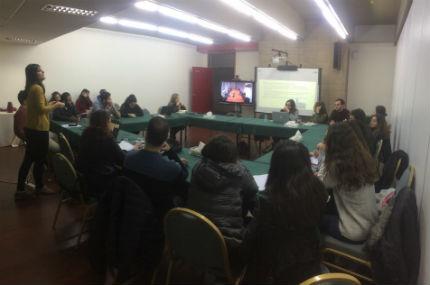Beyond Humanitarianism Paradigm: The Effect of Displacement on Religious Authorities

By Fidaa Al Fakih
LAU’s Institute for Social Justice and Conflict Resolution (ISJCR) and the Department of Social Sciences hosted a seminar on “The Displacement of Religious Authorities from Syria and their Involvement in Aid Provision: Looking beyond Humanitarianism.”
The cross-campus seminar was based on the preliminary findings of Research Associate at University College London Estella Carpi.
Welcoming the attendees, moderator and ISJCR Director and Associate Professor of Political Science and International Affairs Tamirace Fakhoury said the seminar sheds light on the under-researched topic of “how the displacement from Syria has affected religious authorities and how religious authorities have had to reinvent their mission and involvement in aid provision.”
Dr. Carpi then kicked off the seminar by explaining that the field research she has been conducting in Lebanon is part of a much broader project with Dr. Elena Fiddian-Qasmiyeh of University College London under the framework of “south–south humanitarianism.” The research, she said, looks at southern agents of aid provision, particularly faith leaders or religious authorities who try to help their own displaced communities.
Dr. Carpi’s presentation built on her extensive research on faith-based organizations working in the Syria neighborhood, including her engagement with Syrian refugee faith leaders in Lebanon. “I relied on self-accounts of personal experiences in aid provision to the displaced communities once Syrian faith leaders became refugees themselves,” she said.
Dr. Carpi then mapped a geography of displaced religious authorities following their physical trajectories outside of Syria. She also focused on how displacement from war, violence and persecution reconfigures their spiritual role and their social status within receiving societies. By doing so, Dr. Carpi captured how the spiritual mission of such religious leaders changes in response to their own refugee status and their intent to provide aid, support and solidarity to the displaced communities.
Concluding the seminar, Dr. Fakhoury and Chair of the Social Sciences Department Marwan Rowayheb thanked Dr. Carpi for uncovering concepts of humanitarianism that shed light on new actors often overlooked by researchers when studying Syrian refugee challenges in neighboring host societies.
Dr. Rowayheb encouraged Dr. Carpi to account for the structural differences in the nature of the religious establishments in Lebanon, and to examine the competition between Lebanese religious authorities and displaced Syrian faith leaders that in some instances trigger sensitivities.